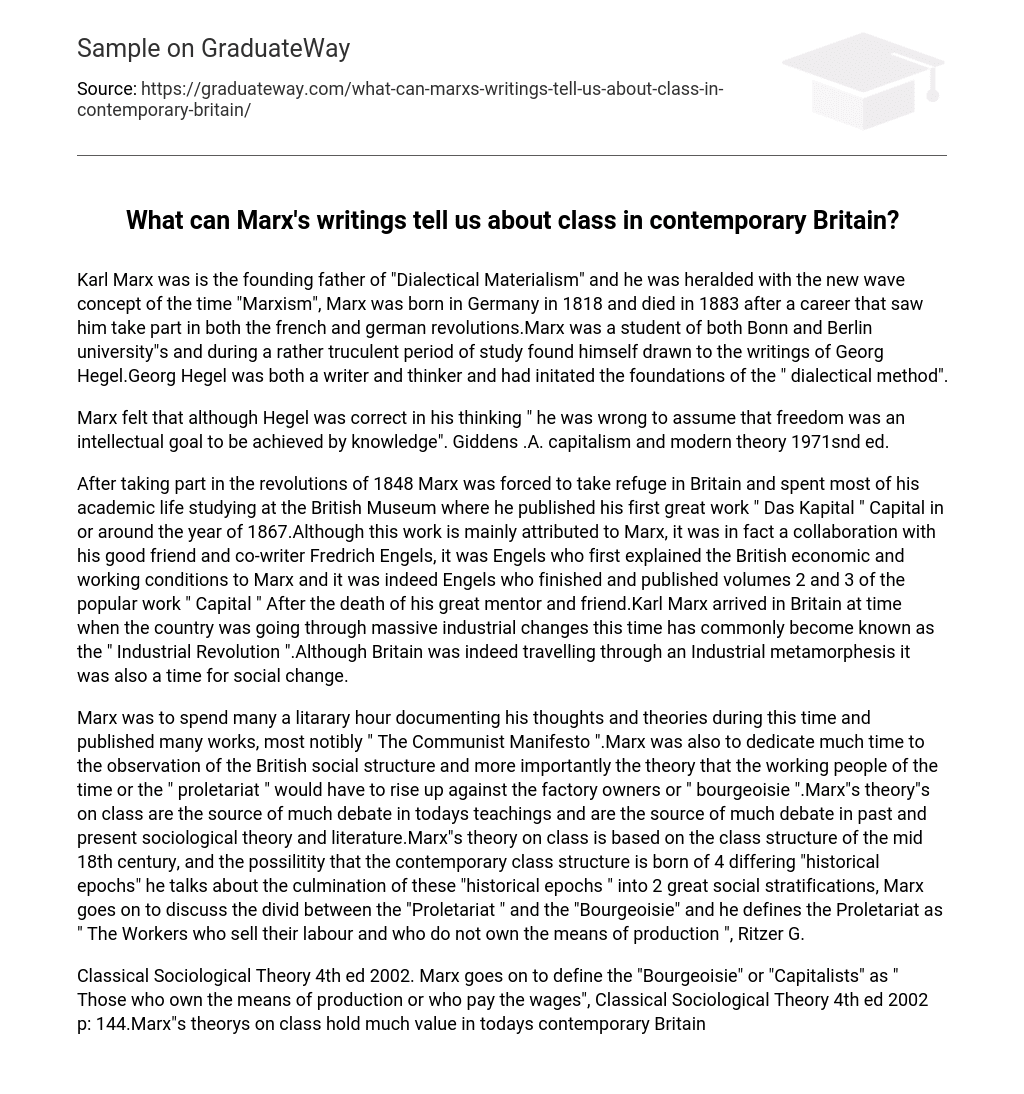Karl Marx was is the founding father of “Dialectical Materialism” and he was heralded with the new wave concept of the time “Marxism”, Marx was born in Germany in 1818 and died in 1883 after a career that saw him take part in both the french and german revolutions.Marx was a student of both Bonn and Berlin university”s and during a rather truculent period of study found himself drawn to the writings of Georg Hegel.Georg Hegel was both a writer and thinker and had initated the foundations of the ” dialectical method”.
Marx felt that although Hegel was correct in his thinking ” he was wrong to assume that freedom was an intellectual goal to be achieved by knowledge”. Giddens .A. capitalism and modern theory 1971snd ed.
After taking part in the revolutions of 1848 Marx was forced to take refuge in Britain and spent most of his academic life studying at the British Museum where he published his first great work ” Das Kapital ” Capital in or around the year of 1867.Although this work is mainly attributed to Marx, it was in fact a collaboration with his good friend and co-writer Fredrich Engels, it was Engels who first explained the British economic and working conditions to Marx and it was indeed Engels who finished and published volumes 2 and 3 of the popular work ” Capital ” After the death of his great mentor and friend.Karl Marx arrived in Britain at time when the country was going through massive industrial changes this time has commonly become known as the ” Industrial Revolution “.Although Britain was indeed travelling through an Industrial metamorphesis it was also a time for social change.
Marx was to spend many a litarary hour documenting his thoughts and theories during this time and published many works, most notibly ” The Communist Manifesto “.Marx was also to dedicate much time to the observation of the British social structure and more importantly the theory that the working people of the time or the ” proletariat ” would have to rise up against the factory owners or ” bourgeoisie “.Marx”s theory”s on class are the source of much debate in todays teachings and are the source of much debate in past and present sociological theory and literature.Marx”s theory on class is based on the class structure of the mid 18th century, and the possilitity that the contemporary class structure is born of 4 differing “historical epochs” he talks about the culmination of these “historical epochs ” into 2 great social stratifications, Marx goes on to discuss the divid between the “Proletariat ” and the “Bourgeoisie” and he defines the Proletariat as ” The Workers who sell their labour and who do not own the means of production “, Ritzer G.
Classical Sociological Theory 4th ed 2002. Marx goes on to define the “Bourgeoisie” or “Capitalists” as ” Those who own the means of production or who pay the wages”, Classical Sociological Theory 4th ed 2002 p: 144.Marx”s theorys on class hold much value in todays contemporary Britain as we now find our-selves living in a “Capitalist society”, the day to day lives of “normal working people” can be examined and although the there is a “Minimum Wage” and more opportunity for economic ascent the country is now as was then run by an “Elite few”.Although the “Proletariat” in todays Britain are protected by new laws and new and advanced social and economic dictums there is also a greater divide in the “Distribution of wealth”, and as the population in todays Britain becomes larger and larger the ecomonic strains on the country become greater and greater, the advent of “Modern Technology” means that there is now a more consumer friendly enviroment in the work place.
The “Proletariat” in todays society has just become much more digitised.The “Capitalists” of today have now harnesed the Electronic era and can command greater investments and profits but at much greater prices and with the minimum of work force, the watch word of todays economy being ” Multi Tasking” multi task training so as to be able to multi skill the work-force. As this concept grows the work force diminishes and the”Capitalist” grows ever richer whilst the “Proletariat” congratutates them- selves on accomplishing the national average wage ,£20880.00per annum.
WWW.National statitistics.gov.uk 2003.
Marx”x writing of yester-year told us of the divide between the working classes and the ruling classes and the requirement for the Poletariat to ” rise up” and enjoy the fruits of the “class-less society”, unfortunately for Marx his dreams of a ” class-less society” although theorectically feasible is both un-obtainable and a little out dated. As Britain continues its growth upwards and outwards Marx”s theoretical template carrys on its desent into its rightful place ” History” !





